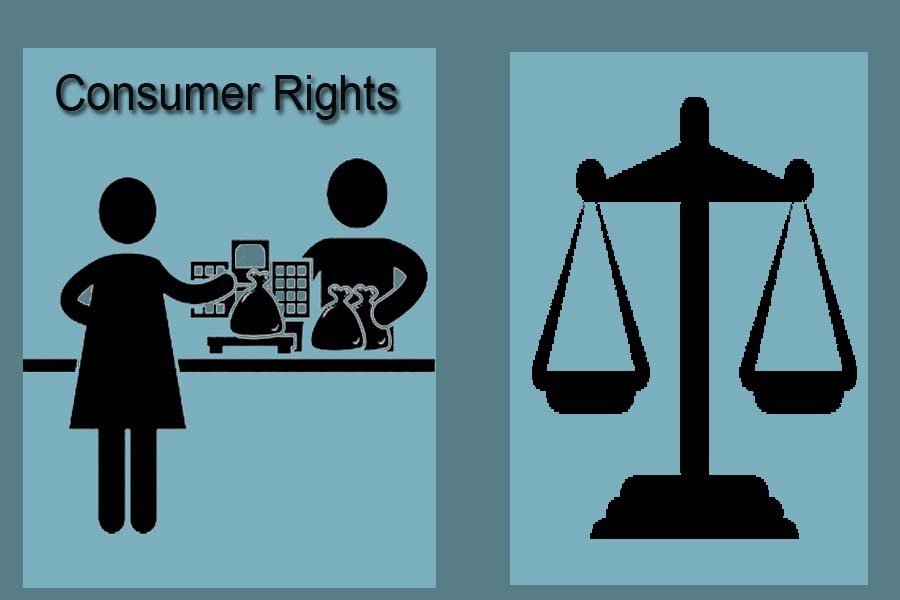Rights breach higher than reported, fear experts
Existing legal frameworks are of little use as consumers unaware

Published :
Updated :

Experts fear infringement of consumer rights in the country is much higher than reported.
They identified lack of awareness among both the consumers and businesses about their respective rights and responsibilities as the key reason for violation of the rights.
A government watchdog, Directorate for National Consumers Rights Protection (DNCRP), regularly conducts drives to monitor the market situation and dispose of the complaints lodged by the consumers.
According to the data available with the DNCRP, during market monitoring the directorate financially penalised 19,234 businesses on charge of resorting to different types of irregularities in the fiscal year (FY) 2018-19 against 11,718 in the previous FY 2017-18.
The DNCRP also fined 5,571 businesses as of October 22 since July 1 this year for the same types of anomalies.
However, the number of complaints from the consumers fell by around 17 per cent to 7,515 in the FY 2018-19 from 9,019 in the previous fiscal.
Under the Consumer Rights Protection Act-2009, a consumer will get one-fourth of the fine money from the DNCRP as compensation after the case in connection with the complainant is settled.
Complainants received Tk 10,09,200 compensations till October 22 this fiscal. Compensation amounting to Tk 24,38,825 was also given to complainants in the FY 2018-19.
Sources said the actual figure of the cases of consumer rights violation will be much higher than reported.
Many customers do not file complaints to avoid harassment while others do not know where and how to lodge complaints, they added.
The most common ways rights violation occurs include not packaging goods rightly, not posing price lists, over charging, sales of fake, adulterated and expired goods, cheating in weight and giving false information through advertisement.
Talking to the FE, Director General (DG) of the DNCRP Bablu Kumar Saha said the DNCRP is conducting drives and running campaigns regularly to make people aware of the consumer rights.
"Our aim is not to punish the traders, but we act to motivate them to change their attitude towards customers," said Mr Saha.
He also said many people do not know to whom and how they should file complaints when their rights are violated.
The existing workforce of DNCRP is inadequate compared to the requirement, said the official, who took over the responsibility a month ago.
"We regularly organise campaign, hold view-exchange meeting and seminars to educate people about the issue," said Mr Saha.
Contacted, Consumers Association of Bangladesh (CAB) president Ghulam Rahman said the overall consumer rights situation is not yet favourable though the government has formulated legal frameworks and constituted some agencies in recent years.
Unlike in other countries, especially the developed ones, Bangladesh's people are not aware of their rights as consumers, that is the key reason for rights violation, Mr Rahman observed.
He said there are agencies responsible for protecting people's rights, like DNCRP, Bangladesh Food Safety Authority (BFSA), and Directorate General of Drug Administration (DGDA).
"Though there are some legal frameworks, the agencies concerned should strengthen their activities for the sake of consumers," he said.
Executive director of Conscious Consumer Society (CCS) Palash Mahmud said there is a need for running a massive campaign about the issue.
"The consumers who lodge complaints with the DNCRP are mostly of young age, because they know about the issue through social media platforms like Facebook," he said.
The CCS mostly works with the young people through its network in different educational institutions to protect consumers' rights and to ensure food safety.
The rights body filed the much-talked-about writ petition with the High Court seeking its directive to withdraw 52 food products from the market and stop their production as they proved to be of substandard in the test conducted by the Bangladesh Standards and Testing Institution (BSTI) in May last.
saif.febd@gmail.com


 For all latest news, follow The Financial Express Google News channel.
For all latest news, follow The Financial Express Google News channel.